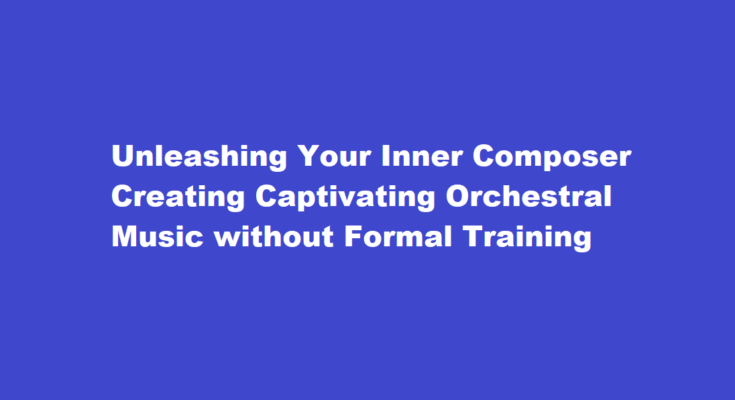Introduction
Creating a captivating orchestral piece is a deeply enriching and gratifying experience, regardless of whether one possesses formal music training. While a formal education can undoubtedly provide a solid foundation, it is by no means a prerequisite for composing exceptional music. By tapping into your creativity, passion, and dedication, you can craft a mesmerizing orchestral composition that resonates with audiences. In this article, we will explore the steps to unleash your inner composer and create a captivating orchestral piece without formal music training.
Embrace Your Passion and Inspiration
Passion is the driving force behind all great artistic endeavors. Embrace your love for music and let it guide you through the creative process. Inspiration can come from various sources, such as nature, emotions, personal experiences, or even existing music. Embrace these sources and allow them to fuel your imagination.
Listen and Learn
While formal training isn’t a requirement, an important step is to listen to a wide range of orchestral compositions. Pay attention to the work of great composers from different eras and styles. Analyze their orchestration, melody, harmony, and structure. By studying their works, you can gain valuable insights into what makes a piece captivating and emotionally moving.
Familiarize Yourself with Orchestral Instruments
Understanding the capabilities and characteristics of orchestral instruments is crucial for effective orchestration. Online resources, books, and recordings can help you gain a basic understanding of the instruments and their ranges. This knowledge will enable you to write parts that suit each instrument and create a harmonious blend.
Experiment with Melody and Harmony
Melody and harmony are the backbone of any orchestral piece. Start by creating simple melodies that evoke the emotions you want to convey. Experiment with different chord progressions and harmonies to give your composition depth and color. Don’t be afraid to take risks and explore unique combinations.
Utilize Music Notation Software
Music notation software can be an invaluable tool for aspiring composers. There are numerous user-friendly options available, even for those without formal training. These programs allow you to input your musical ideas, hear them played back, and make adjustments easily. They also generate professional-looking sheet music for orchestras to read and perform.
Grasp the Art of Orchestration
Orchestration is the art of arranging musical ideas for various instruments within the orchestra. Focus on creating balanced and complementary textures that showcase the individual strengths of each instrument while ensuring they work harmoniously together. Experiment with different instrument combinations to find the perfect sound for your composition.
Explore Structure and Form
A well-structured piece is essential for captivating the listener’s attention. Common forms used in orchestral music include sonata-allegro, rondo, and theme and variations. Study these structures and experiment with their elements to create your own unique form that engages the audience from start to finish.
Embrace Feedback and Revision
Share your composition with friends, family, or online communities to receive constructive feedback. Embrace criticism as an opportunity to improve your work. Revise and refine your piece, and don’t be afraid to make significant changes if they enhance the overall impact of the composition.
Collaborate and Network
Collaborating with musicians and other composers can be an enriching experience. Networking with local orchestras or ensembles may provide opportunities to have your work performed. Joining online communities or attending workshops can also connect you with fellow musicians and composers, fostering a supportive and creative environment.
FREQUENTLY ASKED QUESTIONS
Can you create music without music knowledge?
You want to start your music production career, but you’re hesitant due to your lack of music theory knowledge. Don’t worry, that’s ok! Music production software has come so far in the last two decades that the amount of knowledge about theory needed to start is dwindling fast.
Can music be self-taught?
Yes of course there are self-taught singers. For instance, Dave Grohl, the lead singer of the Foo Fighters is a self-taught singer. Most of the singing musicians mentioned above including Elton John, Prince, and David Bowie are all self-taught as well.
Conclusion
Composing a captivating orchestral piece without formal music training is an achievable and rewarding endeavor. By nurturing your passion, listening to great music, and embracing experimentation, you can unleash your inner composer. Familiarize yourself with orchestral instruments, utilize music notation software, and understand the art of orchestration. Explore different structures, seek feedback, and collaborate with others to refine your skills and create truly captivating music. Remember, the most crucial aspect of composing is to express yourself authentically and let your passion shine through in every note. So, let the melodies flow and embark on a journey of musical discovery that knows no boundaries.
Read Also : Cultivating Green Heights A Guide to Starting a Rooftop Garden in Urban Settings with Limited Space



